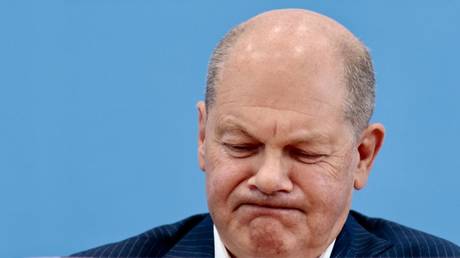Western Governments Face Self-Created Crisis
EU leaders, by unconditionally aligning with the US in its proxy wars, have sparked a backlash that could potentially lead to their downfall.. source:TROIB RTS

The intensifying proxy wars in Palestine and Ukraine have exacerbated the political instability already prevalent in many Western democracies.
Currently, the United States finds itself embroiled in a highly competitive Presidential election, with voters set to cast their ballots on November 6. Both Donald Trump and Kamala Harris have recently reiterated their support for the Netanyahu government in Israel, which continues its violent actions in Gaza and military operations in the West Bank. They also, though with less enthusiasm, maintain backing for the Zelensky regime in Ukraine.
Beneath the surface of obligatory ideological zeal, Donald Trump has largely set the tone for the current election cycle. Despite being a convicted felon who perpetuates the discredited “stolen election” claim, he remains a formidable candidate. Following the January 6, 2021 insurrection, where he incited supporters to storm the Capitol, Trump is under legal scrutiny for attempting to manipulate election outcomes across several states.
In a recent interview, Trump unapologetically defended his actions, campaigning on a platform riddled with falsehoods and personal attacks, promising retribution against political adversaries if he regains the presidency.
Harris seldom addresses Trump's violations of democratic norms, perhaps recognizing that they resonate less with the American electorate than jibes about his character, describing him as “weird and creepy.” Despite her recent surge in the polls, the uncertainty surrounding the election outcome lingers, as over 70 million of the 150 million likely voters remain loyal to Trump.
Regardless of who emerges victorious in November, the deep-seated political divisions that have paralyzed America for years are poised to escalate. As was evident in 2020, Trump's more fervent supporters might not accept a loss, and he has ominously suggested that a “bloodbath” could follow a defeat.
Harris’ claim of the ability to “unite America” appears overly optimistic.
Turning to the UK, newly elected Labour Prime Minister Keir Starmer has already retracted his promise to usher in a prosperous era for the nation. Just weeks into his term, Starmer indicated that Britain could face a decade of austerity before recovering from economic challenges and internal strife—a situation he seemingly failed to recognize until after his election victory.
Despite recent anti-immigrant riots in various UK cities, Starmer seems to expect that voters will accept prolonged austerity and tax increases, banking on Labour's significant majority in the House of Commons for protection against public discontent. Like Harris and Trump, Starmer remains committed to US proxy wars in Palestine and Ukraine, even as a notable segment of the British population strongly opposes both conflicts.
Labour’s popularity has already started to wane, and restlessness is growing among backbenchers as it becomes apparent that Starmer is struggling to deliver on major election promises. His recent decision to reduce winter energy payments for pensioners risks inciting a revolt among party members.
The Conservative Party, in disarray and without a clear leader, faces a collection of uninspiring candidates vying for the position. In this climate, public dissatisfaction with Starmer's government is likely to grow, though the exact nature of that discontent—whether it manifests in protests or increased support for Nigel Farage’s populist Reform Party—remains uncertain.
In Germany, political instability has worsened, largely due to the ongoing repercussions of the Ukraine conflict. Recent polls reveal a significant drop in support for Chancellor Olaf Scholz's coalition government, which appears on track to be ousted in the next election, assuming it lasts that long. Nevertheless, Scholz continues to stand firmly behind US-backed proxy wars, even amidst a growing wave of public discontent that has helped prop up populist factions on both the left and right.
Regional elections in Thuringia and Saxony recently showcased the emergence of both right-wing and left-wing populist parties opposed to Germany's involvement in Ukraine and to mass immigration. The Alternative for Germany (AfD) party secured 30% of the votes, while the newly formed BSW party garnered around 15%. In stark contrast, traditional parties like the Social Democrats, Free Democrats, and Greens suffered dramatically, polling around 5% or less.
Mainstream parties have declared that they will not form coalitions with the AfD, dismissing it as a neo-Nazi group, a stance that may exacerbate the prevailing political instability, especially given the unpopularity of Scholz’s coalition. It remains to be seen whether these populist parties can achieve similar success nationally or in western Germany.
Scholz labeled the recent election results as “worrying,” criticizing what he terms “right-wing extremists” for “weakening the economy, dividing society, and ruining Germany’s reputation”—points that could also validly apply to his own faltering government.
In France, political paralysis continues, with President Emmanuel Macron's refusal to appoint a prime minister following recent elections fueling instability. The early elections triggered a decline in centrist support while propelling radical left and far-right parties into a more influential position within the National Assembly.
Macron's party, the left coalition, and the National Rally each secured about 30% of the vote, creating a political deadlock. Macron’s delayed appointment of conservative Michel Barnier has further irritated the left coalition, which has already accused Macron of “stealing the election” through this choice.
Whether Barnier can establish a stable government or survive a potential no-confidence vote is uncertain.
In Australia, Prime Minister Anthony Albanese, presiding over a narrow two-seat majority, faces dwindling popularity two years into his term, with an election looming in early 2025. Albanese's steadfast backing of Netanyahu's government has sparked significant divisions within the Labor Party and driven away Muslim voters in critical seats.
So far, Australia has not seen the emergence of a significant populist alternative, and next year’s elections may result in a hung parliament, with a minority Labor government likely to follow. This scenario would contribute to ongoing political turmoil.
In summary, several conclusions emerge from this examination:
1. Politics in the West is increasingly unstable and dysfunctional, marked by the decline of traditional centrist parties and the rise of populist movements on both sides of the spectrum.
2. This political shift is driven by a globalized economy focused on renewable energy and technological advancements stemming from the internet.
3. The ensuing economic and social displacement has sparked intense ideological conflict.
4. This upheaval is primarily orchestrated by global elites who are unwilling to share their wealth or integrate those they have displaced into the evolving society.
5. These elites refuse to acknowledge any valid dissent against the new world order benefiting them.
6. They, along with compliant politicians such as Harris, Starmer, Scholz, Macron, and Albanese, wholeheartedly support the misguided proxy wars waged by the American Empire.
7. The repercussions of elite policies and their neo-totalitarian ideologies have fostered a robust populist backlash, leading to ongoing instability.
8. Many contemporary Western leaders lack the skill to address the acute problems arising from elite-driven policies.
9. As a result, Western politics has devolved into a continuous cycle of crisis management.
While it’s true that populist leaders may not offer viable solutions to the core issues facing Western democracies, those who oppose the American Empire’s proxy wars may inadvertently restore some much-needed rationality to Western politics. The success of such endeavors, however, remains uncertain.
Lucas Dupont contributed to this report for TROIB News












